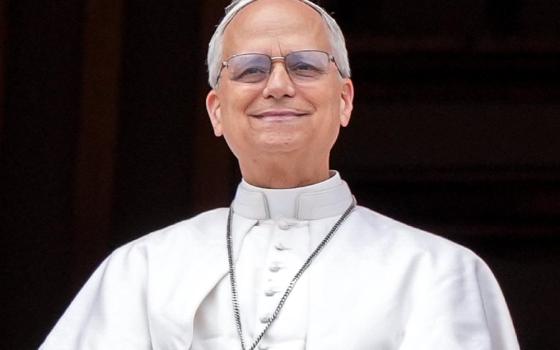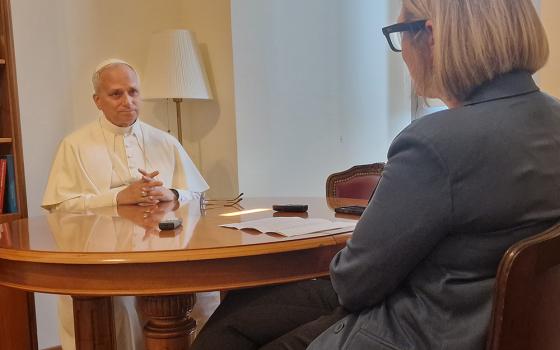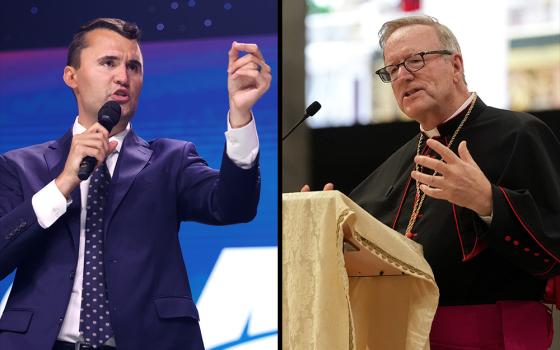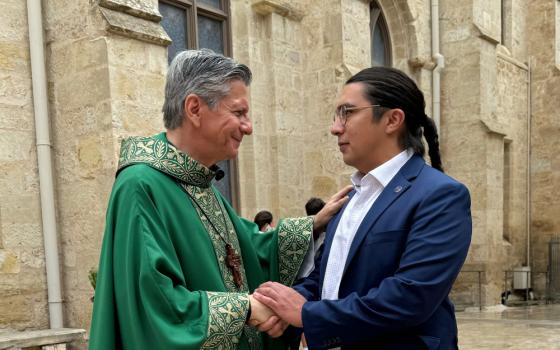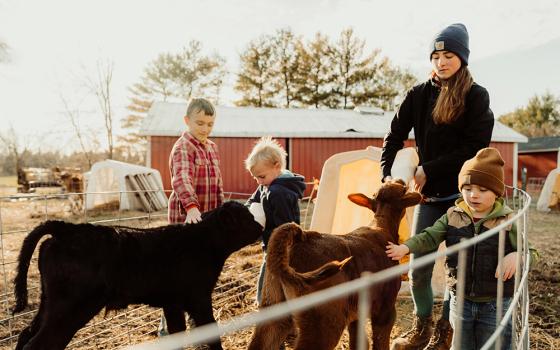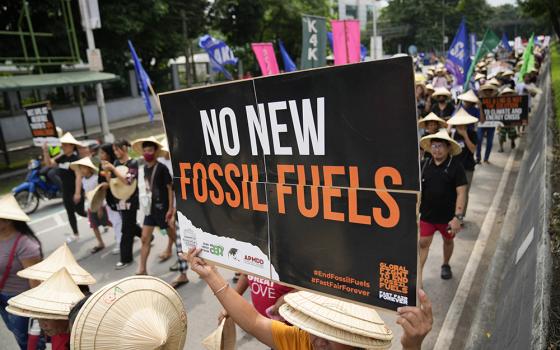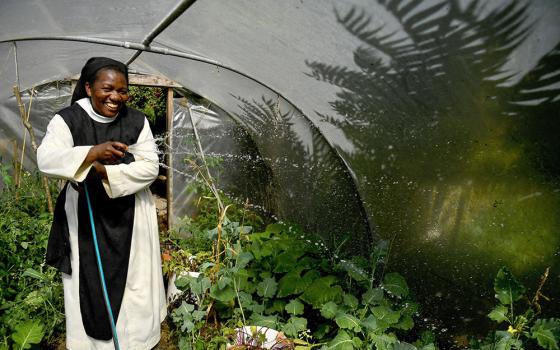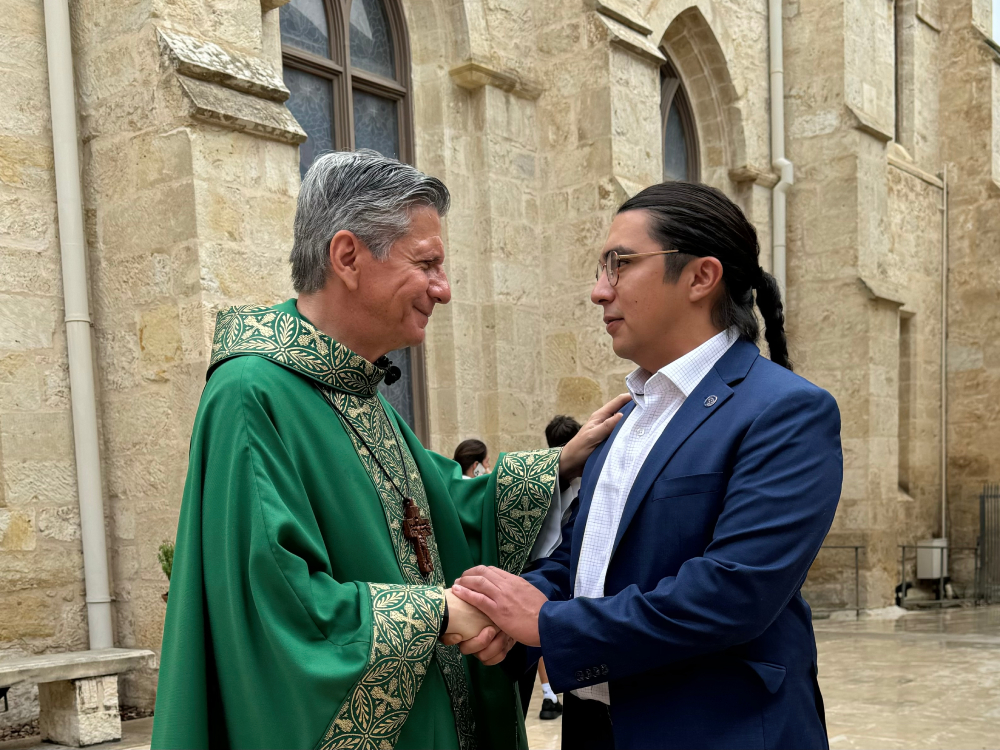
Antonio Frietze, who helped lead an effort for the Archdiocese of San Antonio to join the Laudato Si Platform, shakes hands with Archbishop Gustavo Garcia-Siller during a mass celebrating making a climate action commitment. (Courtesy of Catholic Climate Covenant)
People are either for or against climate action, public imagination suggests. But resistance to climate action comes in many different shades. Some feel powerless, or paralyzed by polarization. Some are confused by or mistrustful of how scientists measure global warming. Some don't feel climate action is a priority. Still others care deeply, but are overwhelmed by the options for solutions.
For Christians who are alarmed or concerned about climate change, the moral imperative as articulated in the Bible or religious teachings like Pope Francis' encyclical "Laudato Si', on Care for Our Common Home" can compel climate action, according to Emma Bloomfield, a communication scholar who has written about engaging religious climate skeptics.
However, for communities where concern for the Earth is not already a priority, the climate discussion strategy might look different. Bloomfield found bringing up Laudato Si' does not always help mobilize. She suggests reaching for commonalities beyond faith, especially when an audience is doubtful or dismissive about climate change. Otherwise, conversations risk becoming more about theology than action.
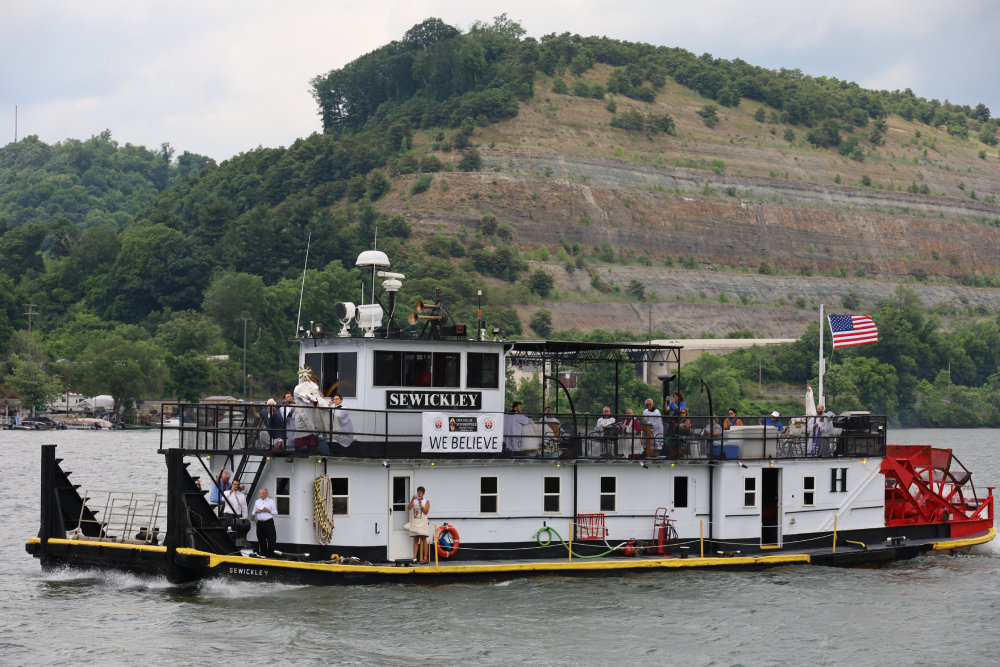
From the sternwheeler in the Eucharistic procession on the Ohio River for Seton Route of the National Eucharistic Pilgrimage June 24, 2024, Bishop Mark E. Brennan of Wheeling-Charleston, W.Va., bestows a Eucharistic blessing to the faithful gathered at the Wellsburg Wharf in Wellsburg, W.Va. (OSV News/The Catholic Spirit/Colleen Rowan)
For 10 years, the Yale Program on Climate Change Communication has collected data on emotional responses to climate change — from alarmed to dismissive — and how to speak to various audiences with messages that mobilize .
So what strategies actually work to mobilize church leaders and people of faith to take climate action? Communication scholars and concerned Catholics shared what has worked for them in recent years, from strategic approaches to specific examples.
Listen first
Lonnie Ellis, a strategic communication consultant who works with Catholic leaders on justice issues, thinks the church is in the position to invite others to dialogue.
"We are one of the few institutions that actually has people, voluntarily, from across the political spectrum spending time together," said Ellis, who works with dioceses all over the country.
Pope Francis modeled dialogue with other stakeholders — convening Indigenous land protectors, interfaith leaders and even CEOs from the world's largest oil and gas companies — and spoke frequently about its importance.
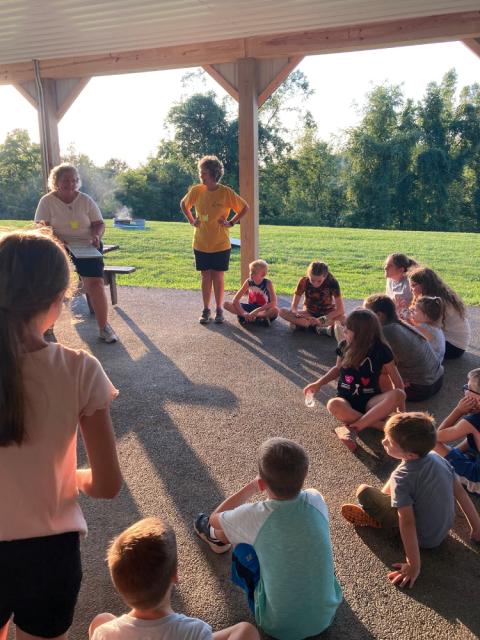
As part of its effort to focus on creation care, St. Francis Xavier Church in Moundsville, W.Va., took parish youths to the town's Grand Vue Park, which overlooks the Ohio River. The children learned about life in Appalachia from storytellers and explored the park. (CNS / Courtesy of St. Francis Xavier Church)
"The church has such a value in being a convener," Ellis said. "We don't have all the answers about how to structure the economy or how to write environmental policy. But we can bring people together."
Ellis found listening first can also open doors in dioceses where climate action has not been a priority.
For example, in 2015 after learning about then-Bishop of Richmond Francis X. DiLorenzo's interest in ministry to the military due to several major U.S. bases in the area, Ellis suggested convening a dialogue with an admiral from Naval Station Norfolk to discuss how climate change impacts national security. The military has long approached climate change as a "threat multiplier" of global conflicts.
Events that foster this kind of connection can move conversation toward action, but every place will be different.
Ellis said in many places he's worked, "If I'd gone in charging and said, 'We need to take climate action,' and used liberal environmentalist language, it would go nowhere."
By listening, you can learn what shared values might be entry points to conversation, while also helping to create a safe environment to discuss possible solutions.
Appeal to shared values
Scholars suggest talking about things that matter to your audience — family, property, community institutions, landmarks — and connecting these to climate impacts. Bloomfield suggests aligning environmental thinking with other economic, political or social values.
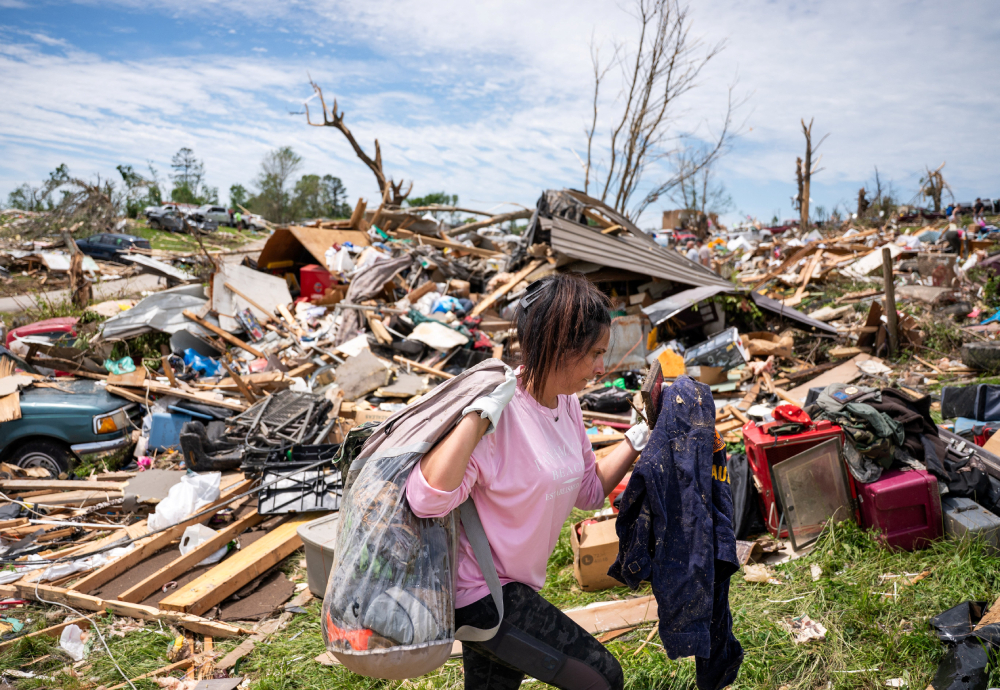
A woman carries belongings from a destroyed home in the Sunshine Hills neighborhood in London, Ky., May 18, 2025, after a series of tornadoes hit the area May 16. At least 27 people were killed by storm systems that swept across part of the U.S. Midwest and South. (OSV News / Reuters / Seth Herald)
Further, these concerns can be integrated with Christians' high value for human life and God's creation, or even considered pro-life.
Bishop Mark Brennan of the Diocese of Wheeling-Charleston told Ellis an important point from Laudato Si' for the church in West Virginia to speak to was the state's natural beauty. In doing so, Brennon echoed the Appalachian pastoral letters: "This Land is Home To Me" (1975) and "At Home in the Web of Life" (1995).
"They're poetic and very hard hitting in terms of social justice and exploitation of corporations manipulating people and land," said Ellis. "For people in West Virginia, home is very important to them. The integrity and the beauty of their home is something they take a lot of pride in."
Joshua van Cleef, the director of peace and justice for the Diocese of Lexington in Kentucky, said parish leaders often say land, water or crops resonate as meaningful topics.
For some regions, concerns for natural disasters and preparedness is a connection point. In Appalachia, severe flooding in 2022 caused 45 deaths and destroyed 900 homes, so some parishes have been involved in relief efforts with a focus on building back stronger, more energy efficient homes.
Advertisement
"In Pittsburgh, with its long history of steel industry, it might be economic innovation," said Ellis. He works with the church in Pennsylvania to convene dialogue with labor unions to discuss the energy transition.
"They have relied on fossil fuel jobs for a lot of their membership," he said. "We're not going to have a strong transition when the jobs that they are supposed to be leaving for solar jobs pay way more than these solar jobs. It's a problem for everyone who cares for the environment."
Unions are also concerned about workplace safety and employer accountability. "We need to be much more committed to a just transition and a sustainable economy that includes family sustaining careers," he said. "We should support making sure the jobs that are being created honor the dignity of workers."
He expects to move dialogue forward on this concern, especially with Pope Leo XIV's interest in workers' rights.
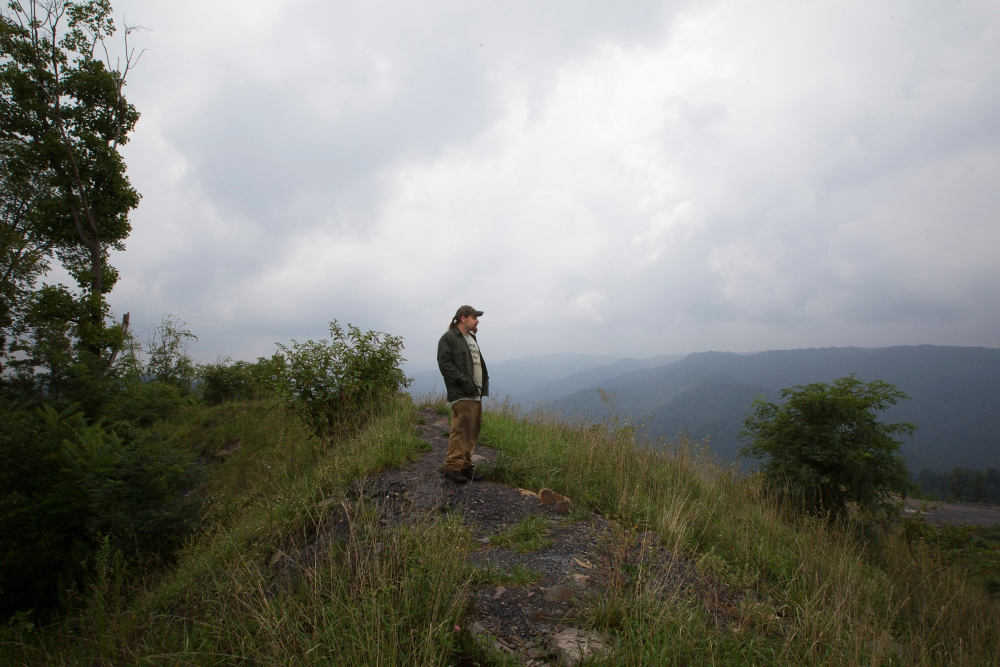
A man in Naoma, W. Va., is seen near the a mountaintop removal coal mine on Kayford Mountain Aug. 19, 2014. The Catholic Committee of Appalachia, a membership-based organization, has served Appalachia, the poor and creation since 1970. (CNS / Tyler Orsburn)
Antonio Frietze, director of continuing education at the Oblate School of Theology in San Antonio, Texas, connected with Bishop Gustavo García-Siller over concern for the poor.
Due to redlining and racial segregation in San Antonio, industrial infrastructure is concentrated in Mexican and Black neighborhoods, leading to higher exposure to pollution and greater health risks for those who live there.
"I could come to the bishop and say: we should care because the environment has inherent value," said Frietze. But instead, he said, "The Earth is the most abandoned and maltreated of our poor, and the poor will suffer consequences of this fractured relationship with the Earth, the first and worst."
In 2024, García-Siller committed the Archdiocese of San Antonio to the Laudato Si' Action Platform.
Emphasize concrete examples
Ellis doesn't necessarily feel that people are afraid of the term "climate change," but they don't always know what it means. Further, some people struggle to trust scientific authorities. They are unsure how to understand if climate change is real or how to measure it.
"If you're talking about the drinking water that they can't drink in McDowell County [West Virginia] because of the mining operations," Ellis said, "that gets really specific for people and much more motivating."
Scholars agree people connect better with concrete examples based on experience, rather than abstract concepts like "climate change."
Van Cleef has had more luck bringing up biodiversity loss, which resonates for his Kentucky audiences. He notes in the past 40 years, "Plant and animal life has declined by 84%… Global wildlife populations have declined by two thirds," and, "In the last 15 years, half of the plastics that ever existed have been created."

An owl rests on a tree branch in the forest of Kermit, W. Va., Aug. 19, 2014. In Pope Francis' encyclical, Laudato Si', he urged that "the entire material universe speaks of God's love. ... Soil, water, mountains: Everything is, as it were, a caress of God." (CNS / Tyler Orsburn)
The environmental crises we face — often intensified by climate change — is measurable and within our lifetimes, he says.
"I think the more abstract our concepts are, the more room there is for people to not connect or feel directly impacted," said Van Cleef. "I try to find ways to speak about the environmental crisis in ways that are meaningful for people, related to their values and the experience."
Offer solutions
Bloomfield said the best solutions to talk about are ones with more than one appeal: solutions that also have economic or social dimensions. But it’s also OK if they are small — often people feel more powerless than opposed to climate action, said Van Cleef.
"I had one pastor say it will be difficult to lay out a plan," said Van Cleef. He leads one of the small rural parishes in Kentucky, which in addition to less resources often lack personnel capacity.
He encouraged him, "Small hinges open big doors. Let's just look at some of the small things you could do."
Could he preach a creation care sermon? Could he include environmental concerns in the prayers of the faithful? Could the church switch to biodegradable coffee filters? Could they swap light bulbs for more efficient options?
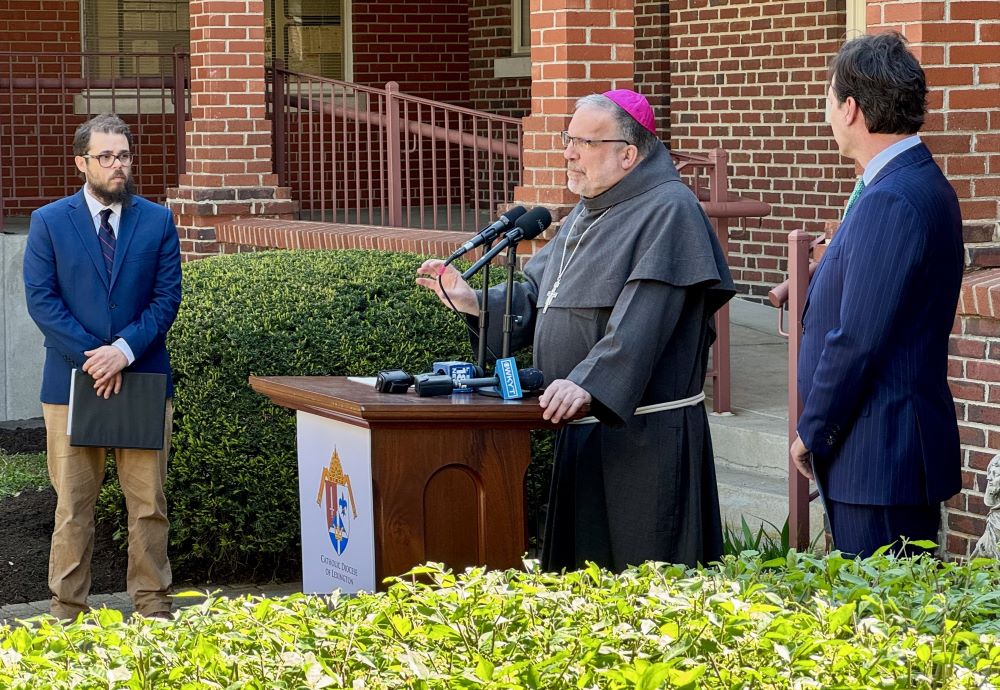
Bishop John Stowe of Lexington, Kentucky, announces a net-zero initiative, pledging to reach net-zero emissions across its 59 parishes as well as schools and other institutions in the next six years. With him at a press conference April 23 are Adam Edelen (right), founder and CEO of Edelen Renewables, and Joshua Van Cleef (left), director of the diocese's peace and justice office. (Courtesy of Diocese of Lexington)
Then he challenged him, "Based on your capacity, let's come up with a plan and that will open up doors to do even more."
However, mobilizing parishes becomes more possible with diocese-level action. Bishop John Stowe committed the Diocese of Lexington to be net zero by 2030, and laid out a process for each parish to write their own environmental action plan. For Van Cleef, this reduces the need to convince anyone to take climate action, but rather places the focus on deciding what action to take.
"I think the modeling that [bishops] do in public is really important," said Ellis.
He reiterated that change is hard and solutions need to feel doable, "If we believe that the solutions are really painful, we'll deny that the problem exists."

